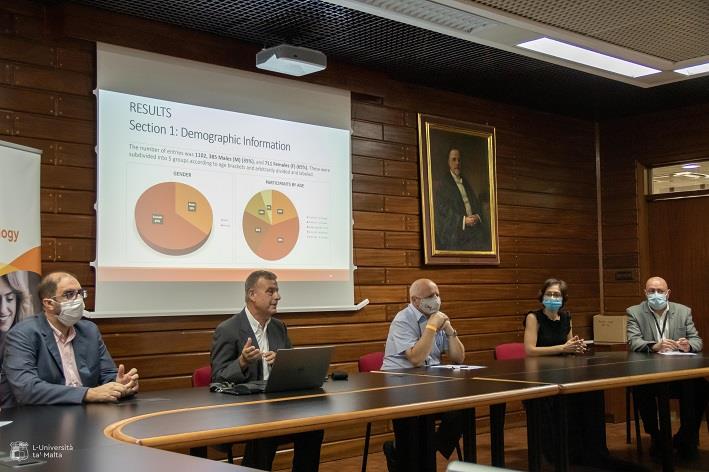A study conducted by the University of Malta’s Faculty of Theology has found that there are increased divergences in the importance of religion between youths and other age groups, continuing to confirm how younger demographics are giving less importance to faith than those who are older than them.
The survey, which was spearheaded by members of the Department of Pastoral Theology, Liturgy and Canon Law, set out to understand some of the effects of the Covid-19 pandemic on the life, faith and meaning of the people living in Malta.
It found that over 90% of those over the age of 30 identify as being Catholic, a significantly less 72% of those between 16 and 30 years of age identify as such.
The survey results showed how only 45% of youths attribute importance to religion and 42% of the same age group believe that life makes sense because of God, compared to 82% of those over the age of 30 in both cases.
Indeed, almost half (46%) of youths stated that they do not see themselves as religious people, with 36% of the same age group saying that they do consider themselves as religious. This is compared to 18% of those over 30 who don’t see themselves as religious and 58% who do.
Asked whether they faith helped them go through the experience of the Covid-19 pandemic, only 28% agreed that it did – far lower than all other age groups (44% of those between 31 and 49, 61% of those between 50 and 59, 67% of those between 60 and 69, and 76% of those between 70-90).
Likewise, only 31% of the youth age group missed going to Church and only 33% of the same age group missed receiving the Eucharist – again far less than all other age groups.
The survey was conducted through an online anonymous survey and had a total of 1,102 responses, 711 of which were females and 385 of which were males. 88% of these participants declared to be Roman Catholic, while 11% claimed to embrace no religion at all.

The survey also found that more Maltese people are open to online methods of worship since the pandemic broke in 2020, but they still believe that public worship together is important.
They missed going to Church, especially receiving the Eucharist. The majority of participants did state, despite the youth divergences, that their faith helped them go through the pandemic experience.
The survey found that the majority of those above the age of 30 found prayer as a source of consolation. They do not think that churches and public worship have become superfluous and continue to see churches linked to their religious identity.
An overwhelming majority approved the restrictions imposed by the Church authorities on religious gatherings and almost 89% did not mind skipping the village feast.
As to whether the lockdown period was a source of more anxiety and stress the replies show a general consensus amongst all the ages: Anxious (77%); Stressed (74%); Exhausted (69%). At the same time, they all felt Thankful (85%); Hopeful (67%) and Resigned (63%).
Rev. Professor Paul Galea, one of the authors of the study, called the study a lens into how the local community behaved and coped with an unprecedented situation, and a great opportunity to plan a better offering of spiritual care in a future distressful situation. “Some of us struggled more than others, some of us found it easier to cope than others. It is our duty to understand what role religion and spirituality has had during the pandemic and whether this experience has brought a significant growth when it comes to facing existential issues”, he continued.
Professor Adrian-Mario Gellel observed that the data at hand confirms the secularisation divide between the younger generation, those under the age of 30, and the rest of the population. This has impacted on the way the young have related to religion and God during the pandemic as well as the way they have tried to cope. They seem, however to be searching for new ways of connecting with their spirituality.
On her part, Professor Nadia Delicata, episcopal delegate for evangelisation and member of the Faculty of Theology whose main area of research is Christianity in digital culture, remarked that it is a sign of hope that local Catholics grasp how “worship”, and the sacraments specifically, demand the fullness of communal presence. Nonetheless, as the Archdiocese’s own pastoral plan promulgated during the pandemic stresses, the Church has a duty to encourage meaningful encounter in all spaces, including augmented digital spaces.
In view of these findings, the Dean of the Faculty of Theology, Rev. Dr John Berry stated that the Faculty is committed to seek new ways how to respond tactfully to society’s needs. Berry explained that this research evidenced that people want the Church to reflect its presence in the digital age; to plan how to be an inclusive church community and to explore new models of “doing church” while somehow “getting back to normal.”.
The Rector of the University of Malta, Professor Alfred J. Vella commended the study. “Taking a snapshot of the challenges experienced during the pandemic, and analysing that through the eyes of professionals, which is something the academics from the Faculty of Theology were able to pitch in through their expertise, makes sure to provide us with actionable results that the community can work on and use to inspire further research”, he said.
The full study can be accessed online.